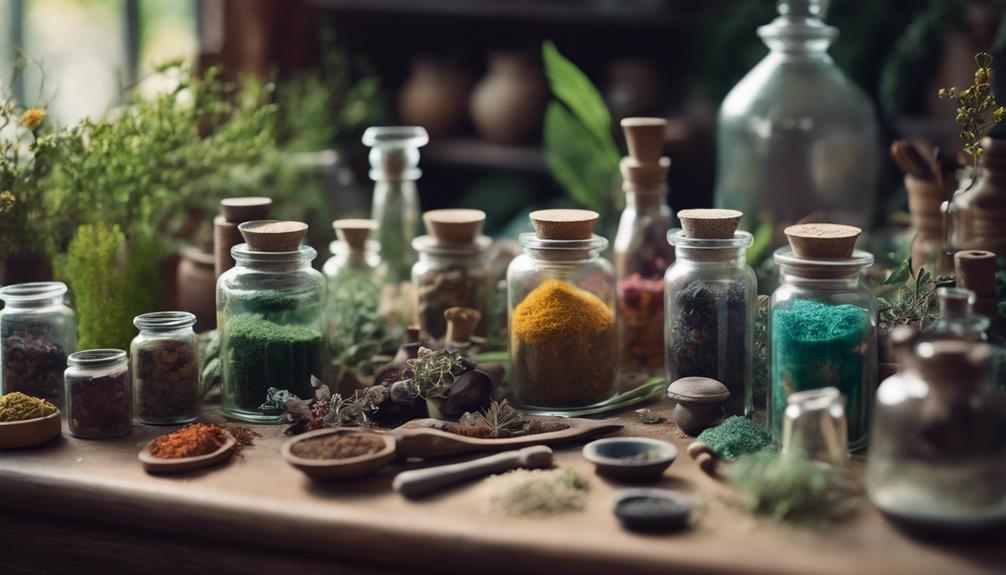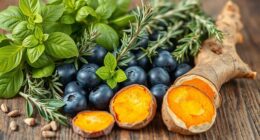We've been using herbalism for centuries to promote health and wellness, with natural remedies like echinacea, ginger, and chamomile tea providing relief from common ailments and stress. We use herbal supplements to boost our immune systems, and adaptogenic herbs like ashwagandha to manage stress and anxiety. Additionally, we incorporate herbalism into our daily lives through skincare, aromatherapy, and dietary supplements. As we explore the modern applications of herbalism, we find a holistic approach that complements conventional medicine. As we continue to uncover the benefits of herbalism, we'll discover more ways to harness its potential for optimal health.
Key Takeaways
• People use herbalism to boost their immune system with herbs like echinacea, which fights off colds and infections.
• Herbal remedies like ginger, peppermint, and chamomile are used to alleviate symptoms of nausea, indigestion, and insomnia.
• Adaptogenic herbs like ashwagandha and rhodiola are used to relieve stress and anxiety, promoting relaxation and calming minds and bodies.
• Herbal supplements are used to support immune function, with echinacea reducing the risk of upper respiratory infections during cold and flu season.
• People incorporate herbalism into their daily lives through teas, capsules, and skincare products, promoting overall health and wellness.
Herbal Remedies for Common Ailments
Moreover, as we delve into the world of herbalism, we often find ourselves reaching for trusted herbal remedies to alleviate common ailments that disrupt our daily lives. We've learned that certain herbs can be incredibly effective in promoting health and wellness.
For instance, herbal remedies like echinacea are used to boost our immune system and fight off colds and infections. Ginger, a popular herb, is known for alleviating nausea, indigestion, and reducing inflammation in the body.
When we're feeling stressed or anxious, a warm cup of chamomile tea can work wonders in promoting relaxation and aiding in sleep. We've also found that peppermint can soothe our digestive system, helping with bloating, gas, and stomach discomfort.
Moreover, turmeric, with its active compound curcumin, has been utilized for its anti-inflammatory and antioxidant benefits in managing conditions like arthritis and improving overall health. By incorporating these herbal remedies into our daily lives, we can take a proactive approach to our health and wellness.
The Science Behind Herbal Medicine

Delving into the world of herbal medicine, we're struck by the significant role plants play in modern pharmaceuticals, with a quarter of drugs derived from botanical sources. As we explore the science behind herbal medicine, we find that it's not just a matter of using plants' parts for medicinal purposes, but also about understanding the importance of herbal medicine.
- Herbal medicine has been researched for its effects on various health conditions, including cancer and chronic diseases.
- It has also been found to have a positive impact on cognitive function.
- In some European countries, herbal medicine is being increasingly integrated into medical and pharmacy school curricula, highlighting its growing significance.
- Providers are learning about the positive and negative effects of herbal medicine, including the essential understanding of drug-herb interactions for safe and effective treatment.
As we continue to uncover the science behind herbal medicine, we're reminded of its potential to address a wide range of health conditions. Standardized herbal extracts are being researched for their potential benefits, and we're excited to see where this growing field takes us.
Using Herbs for Stress and Anxiety

We've all experienced it: the overwhelming feeling of stress and anxiety that can be debilitating at times. As we navigate our busy lives, it's essential to find natural ways to manage these feelings. This is where herbal remedies come in.
Many of us turn to herbal remedies like chamomile, lavender, and lemon balm to help reduce stress and anxiety. Herbal teas containing herbs like passionflower and valerian are popular choices for promoting relaxation and calmness.
Adaptogenic herbs such as ashwagandha and rhodiola are known for their stress-relieving properties and ability to support the body's response to stress. These natural remedies offer a gentle and effective way to calm our minds and bodies.
Herbal Supplements for Immune System

We turn to herbal supplements like Echinacea to give our immune system a much-needed boost, especially during cold and flu season. As we navigate the winter months, we're more likely to reach for natural remedies to keep our immune system strong.
Herbal supplements like Echinacea have been shown to have immune-boosting properties, which can help reduce the risk of developing upper respiratory infections.
Some key things to know about Echinacea supplements:
- They come in various forms, including capsules, teas, and liquid extracts
- Studies suggest they can reduce the risk of upper respiratory infections
- They're commonly used during cold and flu season to support immune function
- It's essential to consult with a healthcare provider before starting an Echinacea regimen
Ancient Roots of Herbal Medicine

As we explore the world of herbalism, we're reminded that the use of plants for medicinal purposes stretches far beyond modern supplements, with ancient cultures laying the groundwork for our understanding of herbal medicine today.
The ancient roots of herbal medicine are evident in archaeological sites like the Neanderthal burial site in Iraq, dating back thousands of years. Traditional Chinese medicine (TCM) has a rich history, with texts like the Shennong Ben Cao Jing (200-250 AD) documenting herbal remedies.
Similarly, Ayurveda, an ancient Indian medicinal system, incorporates herbal remedies like Ashwagandha and Turmeric for holistic health and balance. Indigenous cultures worldwide have rich herbal traditions, such as Native American herbalism using plants like Echinacea and Goldenseal for medicinal purposes.
The Ancient Egyptians also used herbal remedies, as seen in medical papyri like the Ebers Papyrus, which documented over 700 plant-based remedies. These ancient cultures have laid the foundation for our understanding of herbal medicine, and their contributions continue to influence modern herbalism.
Modern Applications of Herbalism

Today, herbalism plays an essential role in modern health and wellness, offering a natural approach to treating various conditions, from anxiety and insomnia to inflammation and digestive issues. We're incorporating herbalism into our daily lives through teas, capsules, tinctures, and topical applications, making it easy to consume and apply. As a complementary and alternative approach to conventional medicine, herbalism is gaining popularity due to its natural origins and potential benefits.
Some modern applications of herbalism include:
- Herbal products and botanical products being used in skincare and aromatherapy to promote overall health and well-being
- Dietary supplements and herbal preparations being used to treat various health concerns
- Blending traditional knowledge with scientific research to create effective herbal remedies
- Natural therapies and herbalism being used in conjunction with conventional medicine to provide a holistic approach to health and wellness
Frequently Asked Questions
What Can Herbalism Be Used For?
We use herbalism to address a wide range of health concerns, from digestive issues and skin conditions to stress and immune system support.
We rely on herbal remedies to promote overall wellness, tackle specific health issues, and support our bodies' natural healing processes.
Whether it's for acute or chronic ailments, we turn to herbalism to complement conventional treatments and even as a preventive measure to maintain our health.
How Is Herbalism Used Today?
As we explore the world of herbalism, it's like opening a treasure chest of natural remedies. Today, we use herbalism in various ways, incorporating it into our daily routines through teas, tinctures, capsules, and topical applications.
We consult licensed herbalists, naturopathic doctors, and traditional healers to tailor treatments to our individual needs and health goals, whether it's managing stress, boosting immunity, or supporting mental health.
How to Use Herbs for Health?
We use herbs for health by consuming them in various forms, such as teas, tinctures, or capsules, to reap their medicinal benefits.
We take Echinacea to boost our immune system or Ginger to soothe digestive issues.
However, we always consult with a qualified herbalist or healthcare provider to determine the proper dosage and usage, ensuring we avoid potential herb-drug interactions.
What Is the Role of Herbal on Human Health?
As a delicate thread weaves together a tapestry, herbalism intricately intertwines with human health. It plays a crucial role in maintaining our well-being by providing natural remedies to combat various health concerns.
We utilize herbal medicine to treat chronic diseases, digestive issues, and skin problems, while also supporting immune function, reducing inflammation, and enhancing mental health.
Conclusion
As we explore the world of herbalism, it's striking to learn that 80% of people in developing countries rely on traditional medicine, primarily herbal remedies, as their primary healthcare option.
As we've seen, herbalism offers a natural approach to health and wellness, providing remedies for common ailments, stress, and anxiety, while also supporting the immune system.
By comprehending the science behind herbal medicine and its ancient roots, we can tap into its full potential and harness its benefits for a healthier future.










